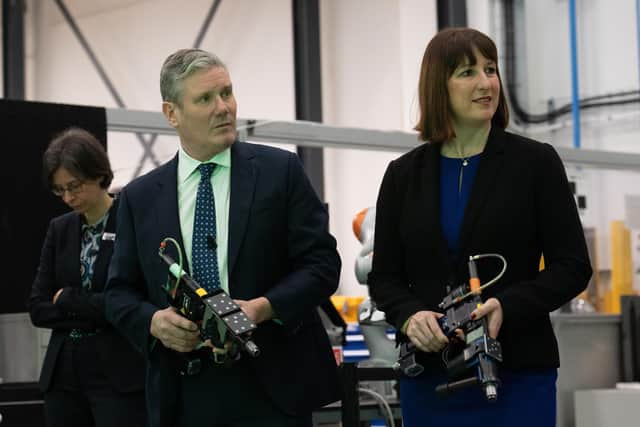No new tax powers for councils under Labour, says Rachel Reeves
The shadow chancellor yesterday told The Yorkshire Post that Labour does not plan to give local authorities new ways to raise money for public services, despite the black hole in many councils’ budgets.
It comes after Sir Keir Starmer this week promised further powers for areas to “Take Back Control” from Westminster.
Advertisement
Hide AdAdvertisement
Hide AdHowever, in an interview with The Yorkshire Post at Leeds City College, Ms Reeves ruled out areas being given new powers over taxation, as the tax burden in the UK is already too high.


The comments were criticised by think tanks specialising in devolution, who argue that the without local taxation powers “levelling up cannot be achieved”.
This places Labour at odds with not only Michael Gove, the Levelling Up Secretary and Jeremy Hunt, the Chancellor, who are both understood to want to give mayors powers over taxation, but also with metro mayors.
Earlier this week Jamie Driscoll, Labour’s mayor for the North of Tyne, told the Guardian that he wanted to see councils able to raise, retain and spend money locally.
Advertisement
Hide AdAdvertisement
Hide Ad“We don’t have plans to give tax-raising powers to local authorities, and the tax burden is at a historical high,” Ms Reeves said.
“The last thing we need at the moment is more taxes being dreamt up by either Westminster or the Town Hall.
“We have put forward a few specific closings of tax loopholes. There are targeted tax increases but that is through closing loopholes.”
Data from the Unison trade union in October found that councils have been forced to slash services in order to fill a £3.2bn budget shortfall in the 2023/24 financial year.
Advertisement
Hide AdAdvertisement
Hide AdLocal authorities currently can only borrow money for capital investment, rather than day-to-day public spending.
It is understood that Labour would not change this, after repeatedly saying that central government would only borrow in order to invest if it were in power.
“Time and time again it is working people who are paying those additional taxes,” Ms Reeves said.
“Everything we do will be fully costed and fully funded, it’s why growing the economy is so important for Labour.
Advertisement
Hide AdAdvertisement
Hide Ad“To improve living standards and to have the money we need for our schools and hospitals we’ve got to grow the economy.”
However, devolution think tanks did not welcome her comments, urging the party to not rule out the move.
Paul Swinney, Director of Policy and Research at Centre for Cities, said: “Giving councils more freedom to raise and spend their own money allows them to take effective action to tackle local problems, make targeted investments, and boost their regional economies.
“Essentially, if we want places to have more control locally, then Westminster will need to give local authorities powers to raise taxes and more freedom over how they spend their money.”
Advertisement
Hide AdAdvertisement
Hide AdJonathan Webb, senior research fellow at IPPR North, said: “In recent weeks, Labour have made welcome pledges around shifting power out of Westminster. It should follow that more tax and spend decisions be included within that.
“Without empowering and trusting local leaders to explore progressive local taxes and move towards a system of fiscal devolution, then a better democracy cannot be realised and levelling up cannot be achieved”.
Henri Murison, Chief Executive of the Northern Powerhouse Partnership, said Ms Reeves has “reasonable concerns” about the level of the tax burden on the public, but said the think tank will be highlighting how both Labour and the Tories can make fiscal devolution work.
He said it will put forward research to show “ways to move taxes in addition to business rates to a local level, rather than being collected and retained by the Treasury.”
“Families' overall burden could be kept the same - but these reforms would be crucial to ending Westminster over-centralisation and closing additional tax loopholes,” he said.